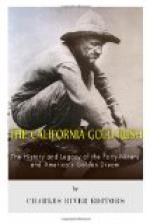They took Casey out through the door of the jail. The crowd gathered its breath for a frantic cheer. The relief from tension must have been great, but Coleman, bareheaded, raised his hand and, in instant obedience to the gesture, the cheer was stifled. The leaders then entered the carriage, which immediately turned and drove away.
Thus Casey was safely in custody. Charles Cora, who, it will be remembered, had killed Marshal Richardson and who had gained from the jury a disagreement, was taken on a second trip.
The street outside headquarters soon filled with an orderly crowd awaiting events. There was noticeable the same absence of excitement, impatience, or tumult so characteristic of the popular gatherings of that time, except perhaps when the meetings were conducted by the partisans of Law and Order. After a long interval one of the Committee members appeared at an upper window.
“It is not the intention of the Committee to be hasty,” he announced. “Nothing will be done today.”
This statement was received in silence. At last someone asked:
“Where are Casey and Cora?”
“The Committee hold possession of the jail. All are safe,” said the Committee man.
With this simple statement the crowd was completely satisfied, and dispersed quietly and at once.
Of the three thousand enrolled men, three hundred were retained under arms at headquarters, a hundred surrounded the jail, and all the rest were dismissed. Next day, Monday, headquarters still remained inscrutable; but large patrols walked about the city, collecting arms. The gunshops were picketed and their owners were warned under no circumstances to sell weapons. Towards evening the weather grew colder and rain came on. Even this did not discourage the crowd, which stood about in its sodden clothes waiting. At midnight it reluctantly dispersed, but by daylight the following morning the streets around headquarters were blocked. Still it rained, and still apparently nothing happened. All over the city business was at a standstill. Men had dropped their affairs, even the most pressing, either to take part in this movement or to lend the moral support of their presence and their interest. The partisans of Law and Order, so called, were also abroad. No man dared express himself in mixed company openly. The courts were empty. Some actually closed down, with one excuse or another; but most of them pretended to go through the forms of business. Many judges took the occasion to leave town—on vacation, they announced. These incidents occasioned lively comment. As our chronicler before quoted tells us: “A good many who had things on their minds left for the country.” Still it rained steadily, and still the crowds waited.




